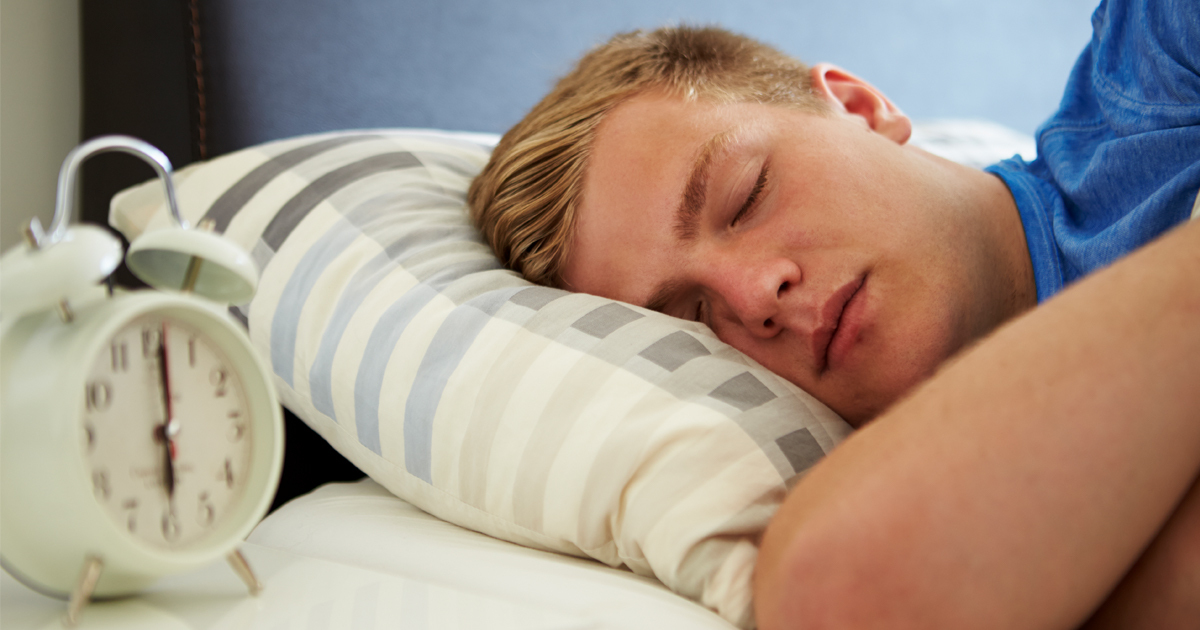
For younger students, this doesn’t usually seem to be a problem. But once the teenage years start, it can seem like your teen is always tired and never gets the sleep they should.
If that’s your teen, you’re not alone.
In fact, 73% of teens report that they don’t sleep enough. That means most teens aren’t getting the zzz’s they need.
Sleep affects more than you may know. Without the right amount of sleep, teens could:
- Become more forgetful
- Develop more skin issues, like acne
- Gain weight and/or overeat
- Become more likely to get sick
- Drive poorly
- Become irritated easily
The list goes on. Sleeping is important, you know that. But sometimes it can feel near impossible to get your teen to sleep, especially if they’re waking up often in the middle of the night.
If your teen is having trouble sleeping, here are a few tips to follow.
Put their phone in another room
Let’s take a moment to talk about those smartphones. They’re more detrimental to sleep than you might think.
A study showed that turning the phone on silent isn’t enough. Small disturbances like a screen notification keeps the brain wanting to check your phone.
Even just being aware of a missed call, an unread text or another notification causes the brain to stay alert, hurting the chance of a good night’s sleep. It knows there is something else to do, and it diverts the attention.
We recommend setting all smart devices (phone, tablet, etc) in another room. If your teen is able to forget about it, they’ll hopefully be able to sleep much better.
Separate their workspace from their sleeping space
As independent study and homeschool students, your teen has the ability to study wherever they want. But, if they’re having trouble sleeping, you might want to consider not letting them study on their bed or in their room.
If they do homework in your bed where you sleep, it’s likely going to make them want to take a nap rather than do math homework. The same goes for sleep. If they’re on their bed where they also do your homework, their brain may think it’s time to study.
Exercise early in the day
Exercise certainly has its benefits. It can make you happier and healthier. Exercising releases endorphins in the brain that make you feel good and have energy.
So, if your teen exercises too late in the day, they might still have some pent up energy, making sleep a difficult feat.
If your teen has practice in the afternoons and can’t really avoid exercising late, then try some relaxing exercises, like yoga, to destress before sleeping.
Limit caffeine in the afternoon
Caffeine is generally known to keep you awake. So….don’t let your teen take it at a time when they should sleep. It takes a couple hours before it leaves the body’s system, so make sure they avoid coffee, energy drinks and other caffeinated beverages after 6 p.m.
Limit naps
Your teen is growing, which means sometimes they need a nap, and that’s OK. But frequently napping, especially in the afternoon, can really interfere with sleep. Try to limit it to a 15-minute power nap if it’s something they need during the day.
Stick to a sleep schedule
It will really help your student’s brain if it knows when it sleeps and when it’s time to be awake. Have them stick to a realistic schedule and be as consistent as possible.
Keep lighting bright in the day and low in the night
Lighting actually plays a big role for sleeping. The brain knows when it’s dark, it’s time to sleep. That means if your teen tries to study in dark room, they’ll probably be a little tired and less focused, and then a little too awake when they actually try to sleep.
Keep lighting bright during the day, and bring it down in the evening so the brain can know to wind down.
Follow a few tips to reduce stress
Stress can be a major culprit of lack of sleep. If your student is feeling anxious or stressed, their brain is going to want to stay awake.
We posted a blog a little bit ago about how to reduce stress in your life. Here are the basic tips for reducing stress:
- Be open with it. Talk with your parents, friends and doctors. All are here to help
- Breath. Breathing exercises work wonders!
- Limit negativity and toxicity in your life. Remember the positives instead.
- Exercise and eat your vegetables. It really impacts your mood.
- Get out and socialize, especially when you don’t want to.
See a doctor
And, of course, if nothing seems to be working, a doctor will be able to help your teen the most. But hopefully these tips above can help them get the sleep they need.

